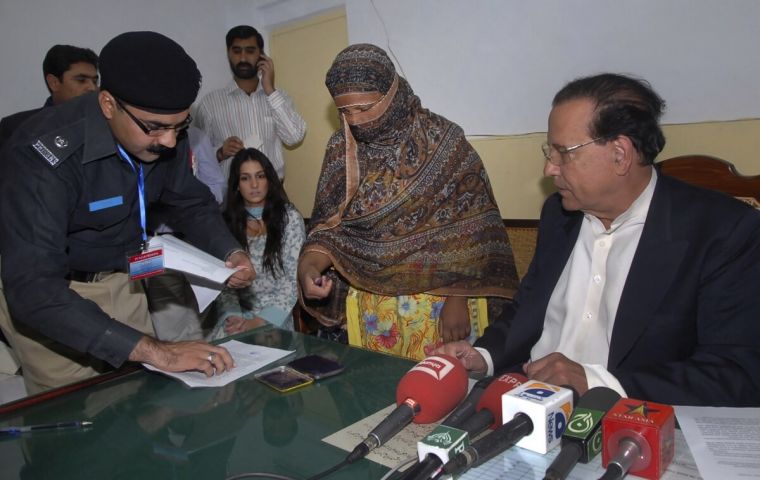Asia Bibi's possible release from jail seen boosting hopes of Christians in Pakistan

The possible release of a Christian woman who has been languishing in prison in Pakistan could have major repercussions in that south Asian country, particularly on other Christians falsely accused of blasphemy and undergoing persecution, a group that started a global petition for the woman's cause said.
Asia Bibi, a mother of five, found herself suddenly thrown in jail after she asked a group of Muslim women, "My Christ died for me, what did Muhammad do for you?"
Bibi asked the question after the Muslim women berated her for drinking water from their own water supply. For uttering that question, Bibi was accused of blasphemy by the Muslim women together with their die-hard religious supporters. She was subsequently arrested and detained. She has been in jail for six years now.
Wilson Chowdhry, president of the British Pakistani Christian Association, the group supporting Bibi, said the Supreme Court's verdict on her case could be a "watershed moment" in Pakistan.
Never before has a Christian blasphemy law victim had to appeal to the Supreme High Court," Chowdhry said, noting that most defendants in blasphemy cases are released at the High Court.
"The legal precedent that may be created as a consequence of a successful appeal could provide protection to future Christian victims faced with cases championed by aggressive, hatred-fuelled Islamic imams, while actual false eyewitnesses fail to appear during any stage of the court process," he said.
"Moreover, a precedent could also limit the type of allegation that will be accepted by courts as a potential blasphemy. For instance, Asia Bibi's appeal focuses on the question she asked 'My Christ died for me, what did Muhammad do for you?' Despite 500 clerics in Pakistan believing the contents of the sentence was blasphemous, the majority of liberal imams outside of Pakistan believe the question exhibits little that could be construed as a blasphemy," Chowdhry said.
Following intense pressure on Pakistan by the international community, Bibi's death sentence was temporarily suspended by the Supreme Court last week as the appeals case against her conviction started.
Bibi's case is set to become one of the most scrutinised in Pakistan.
"The important issue that should be broached is how will the nation of Pakistan react to the potential release of Asia Bibi," Chowdhry said. "A strong security team is required to protect Asia and her family as evidential animosity toward the family is immense. The family will no doubt flee Pakistan, most likely escaping to France where they have already been given honorary citizenship."
Members of religious minorities in Pakistan, including Christians, have been targeted not only by the state's blasphemy laws but also by Islamic mobs who try to take justice into their own hands.
Chowdhry said what will happen to those who have falsely accused Bibi will be crucial.
"Will they be sentenced for perjury? Will the imam be stripped of his title and position and made to face his own court trial? Will any of those that ever attacked Asia physically or verbally be punished for their crimes? In a country where money rules and injustice is ubiquitous, I very much doubt justice will prevail in this situation," he said.
"We can but hope that some focus on such matters will materialise, as the current impunity for crimes of this nature has to be addressed, and what impression counter arrests would make."
A Dominican priest in Pakistan, Father James Channan, said the case of Bibi highlights the need for Muslim-Christian talks.
"The Supreme Court of Pakistan has made a great move as her death sentence was put aside," he said. "I firmly believe that justice will be done, that she will be proven innocent and that she will be released."
"The blasphemy law was used (in Bibi's case) to settle a personal score – the accusation was an act of revenge," said Father Channan.











